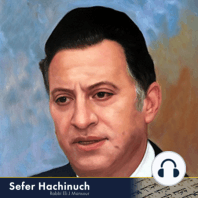20 min listen
Misva #83: The Prohibition Against Accepting Bribes
FromSefer Hachinuch
ratings:
Length:
20 minutes
Released:
Nov 29, 2021
Format:
Podcast episode
Description
The Torah commands in Parashat Mishpatim (Shemot 23:8), “Ve’shohad Lo Tikach” – “And you shall not accept a bribe,” establishing a Biblical prohibition which forbids judges from accepting a bribe from either litigant. The Gemara clarifies that the Torah forbids accepting a bribe even from the litigant whom the judge feels is correct. Although the bribe in such a case does not distort the trial, and the same decision is reached as would have been reached without the bribe, accepting the bribe nevertheless violates this Biblical command. The Sefer Ha’hinuch explains that the Torah forbade accepting bribes even from the correct litigant so that judges do not accustom themselves to accepting bribes. If judges accept bribes from the correct litigant, they will end up receiving bribes even from the other litigant and will thus be driven to rule dishonestly. Even if a litigant does not give anything to a judge, but he compliments him or does a small favor, this constitutes a bribe, as the judge becomes predisposed to rule in his favor. If a judge receives a compliment from a litigant, the Sefer Ha’hinuch writes, he must make a conscious effort to ignore it and pay no attention to it whatsoever. (This resembles the Halacha requiring one who heard Lashon Ha’ra – negative speech about another person – to consciously reject the information, and not believe what he heard.) Even so, as the Gemara establishes in Masechet Ketubot, a judge whom a litigant attempts to bribe in any way becomes disqualified from trying that case. A judge who accepts a bribe transgresses this prohibition, but he does not receive Malkut because he can rectify his violation by returning the bribe (“Lav Ha’nitan Le’hishabon”). He is also included in the curse which the Torah pronounces against those who accept bribes (“Arur Loke’ah Shohad” – Debarim 27:25). The litigant who offered the bribe is in violation of the Torah prohibition of “Lifneh Iver Lo Titen Michshol” – “You shall not place a stumbling block before a blind man” (Vayikra 19:14), which forbids luring one’s fellow to sin. The Hazon Ish (Rav Avraham Yeshaya Karelitz, 1878-1953), in his work Emuna U’bitahon (chapter 3), raises the question of how to reconcile this prohibition with the Halacha allowing a Torah scholar to rely on his own lenient rulings. For example, if a Torah scholar inspects an animal which he slaughtered and needs to eat, to ensure that it is kosher, he may rely on his determination that the meat is permissible for consumption. Even if he is destitute, and if this meat is found to be forbidden he will have nothing to eat, nevertheless, he may rely on his conclusion that the meat is permissible. Similarly, if a scholar has a large amount of Hametz which may have been in his possession during Pesach, in which case it would be forbidden, he is trusted to determine its status and to keep the Hametz if he concludes that it is permissible. The reason, the Hazon Ish explains, is because the most important concern for a Torah scholar is the truth, and he can thus be trusted to issue a truthful ruling rather than wrongly reach a lenient conclusion because of a vested interest. But if this is the case, the Hazon Ish asks, then why are judges not allowed to accept bribes? A judge, quite obviously, is appointed only if he is an accomplished Torah scholar. Why, then, can he not be trusted to reach a correct, truthful decision despite receiving a bribe? The Hazon Ish answers that bribes possess “a special impure force which closes the mind of the judge.” Just like the Sages taught that forbidden foods have deleterious spiritual effect upon those who eat them, similarly, a bribe has the spiritual power to impair judgment. This is the meaning of the verse which warns that a bribe “blinds the eyes of the wise.” Even those who are passionately committed to the truth are adversely affected by bribes and are prone to ruling dishonestly, because of the unique “impurity” which a bribe imparts within a judge’s
Released:
Nov 29, 2021
Format:
Podcast episode
Titles in the series (100)
Misva #1: Periya Ve’riba – Procreation: Daily Sefer Hachinuch - Brought to you by itorah.com by Sefer Hachinuch
